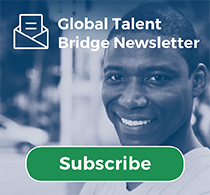A confident woman with a radiant smile, Arlene Mora-Rausseo describes her journey from working as a surgeon in Venezuela to arriving in the United States as a refugee.
Born in Maracaibo, Venezuela, Arlene credits her mother with helping her excel in school and college. In 1993, she graduated from medical school at the University of Zulia and worked as a rural doctor while she finished additional postgraduate studies. Arlene also received the title of professor ad honorem for the undergraduate clinical chair of gynecology and obstetrics and held various public health positions over the next few years—all while raising two children. “I was very passionate and happy,” she recalls. “It is very gratifying when you are able to help a woman.”
In October 2017, just a year before her retirement, Arlene’s life suddenly changed. Fearing for her safety and that of her younger son, she and her child fled Venezuela and sought refuge in the U.S. She was safe from persecution but was now faced with the uncertainty of finding her economic footing in a new country. At age 51, with limited English language skills, no family support, and a career that was not easily transferable to the U.S. job market, she had to start over.
Losing Financial Security and Social Safety Nets
According to a 2023 spotlight by the Migration Policy Institute (MPI), Arlene is one of 45.3 million immigrants living in the U.S. who face systemic barriers to workforce inclusion. For many immigrant women—who make up 51 percent of all U.S. immigrants—the path to economic mobility is further complicated by the family support systems they’ve left behind. These often include help with childcare and shared household income. Upon arrival in the U.S., internationally educated immigrant women like Arlene are too often advised to take entry-level, low-wage jobs—earning enough to feed their families, but not receiving the support or guidance they need to obtain commensurate employment.
Arlene explains that the lack of wraparound services, support systems, and community networks leads to unique challenges for immigrant women navigating the workforce while caring for their children and managing their households.
I think for all immigrants it is difficult to establish themselves in a new country. However, as women, we travel alone without our husbands, we come here without the support of our mothers. It is difficult not only to get used to the culture and the language but also to manage such simple things as taking kids to school or even getting a driver’s license. In my country, I had my mother, or I could pay a nanny to take care of the kids. When I arrived here, I had to do everything alone. —Arlene
Overcoming Barriers and Giving Back
The language barriers, transportation challenges, and childcare obstacles Arlene faced did not deter her indefinitely. Searching for opportunities to pursue work in her field and help women in her new community, she soon discovered the local YWCA. This organization provides programming for early childhood education, after-school care, community health, and a range of economic empowerment services such as job training, financial literacy courses, and newcomer resource fairs. Many of these offerings help lower the barriers immigrant women contend with when rebuilding their careers in the U.S.
While waiting for her work permit, Arlene searched for opportunities to get involved in the local community. She learned about the local YWCA and contacted the center’s director of economic empowerment and offered to help as a volunteer. Then, in 2021, as the world was reeling from the COVID-19 pandemic, she was hired as part of the YWCA vaccination program. Arlene earned certification as a community health worker and in 2022 received a credential evaluation through World Education Services (WES) that assessed her education in Venezuela. Finally, her Doctor of Medicine degree was recognized in the U.S.
In June 2022, the YWCA hired her as its women’s health services coordinator. “This job is an excellent opportunity to put my education, experience, and skills into practice, and contribute to the development of this great country,” says Arlene. With appropriate access and supports, many more immigrant women like Arlene could have opportunities to utilize their experience and training, building more inclusive communities throughout the U.S.
Thriving by Helping Her Community
Today Arlene is thriving, as are the many residents in her community whom she has helped.
“I am three days away from celebrating 30 years since my graduation as a medical surgeon. What I like most about my job, what I think about when I go to bed and gets me excited when I wake up, is knowing that today, I’m going to help someone. I became a doctor because I love helping people.”
While Arlene does not work in a clinical setting these days, she has found a new way to continue her passion of supporting women’s health. As the interview comes to an end, Arlene pauses for a moment. “Really, it’s a service vocation, it is something you have here,” she says, pointing to her heart.
Sign up for our upcoming webinar to learn more about Arlene’s journey, the YWCA’s work with immigrant women, and how your organization can support the workforce inclusion of immigrant women like Arlene.
Our interview with Arlene Mora-Rausseo was translated by Leticia Farrera, program manager at WES Global Talent Bridge.



